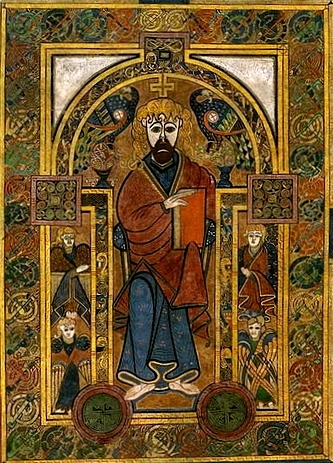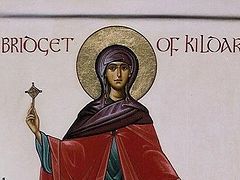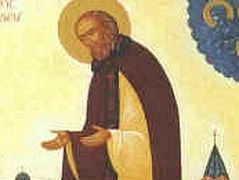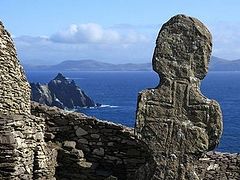
My “inside minor” when I was doing doctoral studies in theology at Duke, was the history of the Church in the British Isles, particularly during what is now termed “Late Antiquity.” That period was formerly known as the “Dark Ages,” but this was a title invented by moderns in order to create a narrative of history in which all things were wondrously evolving towards modernity. Most of the narrative surrounding the Dark Ages is false. It shows up in movies in strange ways as well. Film makers seem to think that everything should be dirty, poorly lit, and foggy. A few choice scenes in Monty Python films do a wonderful send up of such nonsense.
When you begin reading primary materials from the period, they seem strangely familiar, particularly if you happen to be an Orthodox Christian. The Venerable Bede’s History of the English People is, doubtless, the best place to start. Although his work is not primarily concerned with the Celts, they do play an important part.
What is seen is not some alternative version of Christianity (as many moderns would like to pretend), but a thoroughly Orthodox incarnation of the Church with proper attention to its native culture. This is a hallmark of the Orthodox—we love cultures! Many people today like to point to the Orthodox and our ethnic groups (Greek, Russian, Romanian, Serbian, etc.), and mock such divisions as being an ethnic captivity of the Church. It is nothing of the sort. From the beginning, the early Church carried the gospel into various lands and immediately began the task of translation and enculturation. One and the same faith was planted everywhere, but was everywhere unique and appropriate to its people.
It was only later that Latin became a “Church language” in the West, suppressing other cultures. The mission to the English (Angles) had a decidedly Latin flavor (it was initiated by St. Gregory the Great of Rome). But even this early work had a very Orthodox take. The missionary Bishop, Augustine of Canterbury, wrote letters to St. Gregory asking for guidance. He noticed that there were different customs and practices in place among the Celtic Christians (as well as in the Church in Gaul). St. Gregory’s answer reveals the Orthodox approach:
Augustine’s Second Question. Whereas the faith is one and the same, why are there different customs in different churches? and why is one custom of masses observed in the holy Roman church, and another in the Gailican church?
Pope Gregory answers. You know, my brother, the custom of the Roman church in which you remember you were bred up. But it pleases me, that if you have found anything, either in the Roman, or the Gallican, or any other church, which may be more acceptable to Almighty God, you carefully make choice of the same, and sedulously teach the church of the English, which as yet is new ln the faith, whatsoever you can gather from the several churches. For things are not to be loved for the sake of places, but places for the sake of good things. Choose, therefore, from every church those things that are pious, religious, and upright, and when you have, as it were, made them up into one body, let the minds of the English be accustomed thereto.
The regularization of all things was a much later development in the West (as well as in the East to a certain degree). But, to this day, there remain many different practices among various Orthodox Churches.
Perhaps the most striking aspect of Celtic Christianity was the role of monasticism. The missions to the Celts occurred mostly after the rise of desert monasticism, indeed, they were pretty much coincident. For whatever reason, monastic Christianity and all that accompanies it took deep root among the Celts and the English as well. Some historians seem to exaggerate monastic authority among the Celts and suggest that even bishops were subject to them. Lately that claim has been largely refuted.
But the monastics in the British Isles, like the monastics across the Christian world of Late Antiquity, became a primary force within the whole of Church life. They were missionaries. They were librarians. They were copyists. They were authors. They were hymnographers. They were a hedge against the power of the state. They were protectors of Orthodox teaching.
The notion popularized in the eponymous book, How the Irish Saved Civilization, does not exaggerate the importance and the role played by monastics. Today’s conversations surrounding the “Benedict Option,” are referring to an essential part of this monastic role. Frankly, I do not think anything less than a radical renewal and growth of monasticism within Orthodoxy will meet the crisis of the coming deluge.
It is exciting to me that people want to study and understand this part of Orthodoxy, whether among the Celts, the Brits, the Russians, Greeks or whomever. The suburbanized consumer Church of contemporary Christianity is a vanguard of failure and apostasy. Civilization needs saving yet again.




This is so vitally important it needs emphasizing. It is why our Church has not become an enemy of any national people, as others have done in the West with their insufferable pandering to welfare seekers and terrorists.
I'm scotch-irish, I was raised on the Cumberland Plateau in middle/east TN so a very 'Appalachian' protestant upbringing. I was one flavor of baptist or another from birth until being Charismated as Orthodox in April 2015. However my journey from evangelical to Orthodoxy started years earlier. I enjoyed reading the article, particularly as it applied to Celtic faith.
I must say though, I copied the quoted phrase for keeping. There was not one, single, element that had me searching for truth but a whole series of items.. however that sentence works quite well as a summation.
Thank you.